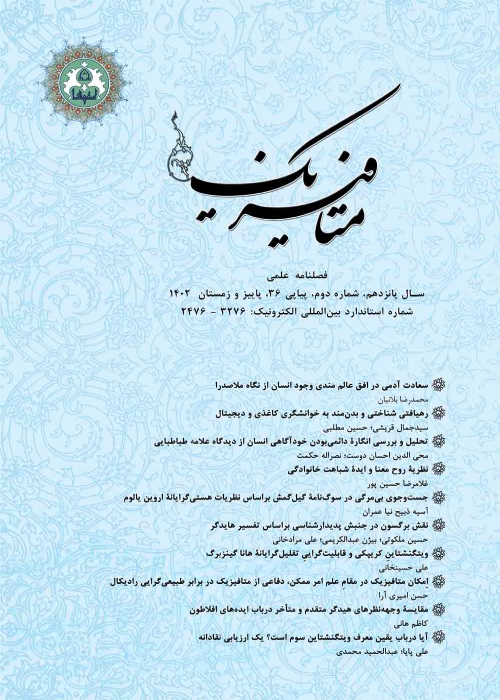The Birth and Death of Tragedy in Nietzsche's thought
Abstract:
Friedrich Nietzsche، one of the most influential and thoughtful philosopher in the 19th century، in an attempt to reassess values، finds himself in confrontation with accepted ideas of the modern world. Therefore، in his critical review، in order to reform and revive the modern civilization and culture، he writes his first book، i. e. The Birth of Tragedy. His various intentions in this book are as following: a) cultural concerns and saving the culture of his age from nihilism and the danger of falling apart، b) reassessing values، c) showing the opposition of Christianity and conceptual philosophy of Socrates with the nature of life، Dionysus element as well as the desire to live، d) aesthetic interpretation of living and being and e) viewing life from the perspective of art. Nietzsche considers the last two cases as the special features of Greek''s tragic art and praises Greek''s tragic age for such perspective. He admires ancient Greeks as well as their culture and thought because they are the creators of tragic art and through such creation as well as by considering Dionysus element they accepted life with all of its good and bad aspects. Nietzsche discusses two fundamental concepts of birth and death of tragedy as well. However، he views the birth and death of tragedy in two different ways; a) in a particular age، Greek tragedy emerged from Greek culture and became an influential factor in the development of that nation’s culture but died later on، b) Nietzsche''s hope in the re-emergence of Greek tragic art in the modern world lies in Wagner''s music which died، too. In his view، the factors behind the death of tragedy are as following: the Socrates'' conceptual philosophy and Euripides'' plays، Christianity and ethicality as well as modern dialectic and Wagner himself. This article، first، tries to study Nietzsche’s important intentions in writing The Birth of Tragedy and explain such birth in the first sense emphasizing the interpretation of its origin and constituents. In addition، this research attempts to indicate، from the viewpoint of Nietzsche، why and how tragedy died.
Language:
Persian
Published:
Metaphysic, Volume:6 Issue: 1, 2014
Pages:
93 to 110
magiran.com/p1317099
دانلود و مطالعه متن این مقاله با یکی از روشهای زیر امکان پذیر است:
اشتراک شخصی
با عضویت و پرداخت آنلاین حق اشتراک یکساله به مبلغ 1,390,000ريال میتوانید 70 عنوان مطلب دانلود کنید!
اشتراک سازمانی
به کتابخانه دانشگاه یا محل کار خود پیشنهاد کنید تا اشتراک سازمانی این پایگاه را برای دسترسی نامحدود همه کاربران به متن مطالب تهیه نمایند!
توجه!
- حق عضویت دریافتی صرف حمایت از نشریات عضو و نگهداری، تکمیل و توسعه مگیران میشود.
- پرداخت حق اشتراک و دانلود مقالات اجازه بازنشر آن در سایر رسانههای چاپی و دیجیتال را به کاربر نمیدهد.
In order to view content subscription is required
Personal subscription
Subscribe magiran.com for 70 € euros via PayPal and download 70 articles during a year.
Organization subscription
Please contact us to subscribe your university or library for unlimited access!


